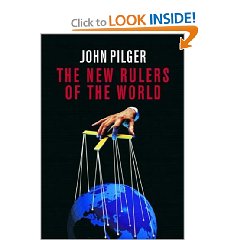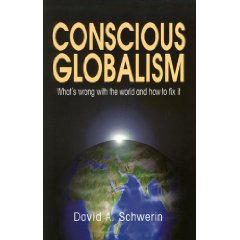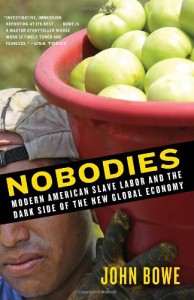 Have Ordered Book to Do It Justice, Initial Reaction is Pooh, July 12, 2008
Have Ordered Book to Do It Justice, Initial Reaction is Pooh, July 12, 2008
Michael Heller
EDIT of 11 August 2008: Not going back to the book. Glad I gave it four stars to begin with, brilliant on one idea in narrow context, but disappointing in relation to immoral capitalism, breaches of political trust, true costs, cradle to cradle, the power of we, and so many other bigger ideas, just not going to do this a third time.
EDIT of 19 July 2008: After a second pass, I see one idea that I did not recognize at first: that unlike MEGA-ownership (e.g. destruction of all family farms), it is MICRO-ownership that the author addresses. HOWEVER, this is largely a specious distinction for two reasons: first, all the patents tend to be owned by MEGA organizations (including one recently created to do just that–buy patents as a basis for litigation); and second, micro-ownership by micro-people is easily resolved with money. I continue to see a lack of strategic perspective on how to restore the Commonwealth of the Republic by firing Congress, having a second Constitutional Convention, creating an amendment that restricts personality protection to individuals born in the USA of at least one citizen-parent, and so on. In the middle of a Hackers on Planet Earth conference, so the detailed dissection will have to wait a week.
EDIT of 15 July 2008: I have spent an hour with this book. It is a strange mix of interesting detail, facile assumption, grotesque naivete (or disingeneousness), along with some robust ignorance, topped off with extraordinarily detailed property law discussions to the exclusion of all else. The INDEX does not list the words Corruption, Crime, Culture, Ethics, Politics, Public Interest, or White House. Congress has five (I am *not* making this up) references. There is no bibliography, something I find especially annoying. The author is oblivious to key references (for example, in his discussion of spectrum, he makes no mention of the single most important reference in recent time, David Weinberger on “Open Spectrum.”)
Case in point: the author goes on about how 25 more runways would solve all our air traffic congestion problems. He evidently has no clue, or does not wish to dilute his point, about the alternatives to “hub” airline travel, among which NASA and (now DayJet) include point to point aviation; and of course high-speed trains,as well as a restoration of home rule, eat local, and so on.
At first serious glance (one hour), this book fails to factor in white collar crime, organized crime, political crime, or public ignorance. To his credit the author states, in a rather low-key fashion, that the extension of copyright may not be in the best interests, but the reader must struggle to find harsh detailed references about how Disney and the music and film industries have orchestrated billion dollar corruption and mass deception campaigns to steal from the public.
Bottom line: when I finish reading this and dissecting it, I am sure it will be a weak four. My original pre-evaluation remains valid. Should it be weakened by a full reading of this book, I will be the first to say so.
SIDE NOTE: The rapid posting of several rather shallow reviews is not unusual, what *is* unusual is the equally rapid number of positive votes for reviews that generally lack specificity or any evidence of familiarity with broader literatures and larger contexts. Could the publisher be stacking the deck? Am interested in a co-reviewer willing to dialog as we dissect this book together. My email is bear/oss.net.
—original pre-assessment below—
This book is getting enough traction, but strikes me as very out of touch with a broad range of libertarian, collective intelligence, and citizen home rule, to the point that I expect my own review will be negative.
Let's start with corporate personality. The limited liability of corporate officials who have looted one fifth of the financial value, funded two dysfunctional parties, and the limited accountability of public officials who have sold public land and public spectrum to corporations below market value, while refusing to invest in local education and welfare, are all part of a massive decline of the Republic.
Of course too much private ownership is bad for the economy. Duh.
Here are a few books that I recommend alongside this one:
The Battle for the Soul of Capitalism
Running on Empty: How the Democratic and Republican Parties Are Bankrupting Our Future and What Americans Can Do About It
No Logo: No Space, No Choice, No Jobs
Confessions of an Economic Hit Man
Crossing the Rubicon: The Decline of the American Empire at the End of the Age of Oil
The Sorrows of Empire: Militarism, Secrecy, and the End of the Republic (The American Empire Project)
The Case Against Wal-Mart
War is a Racket: The Antiwar Classic by America's Most Decorated Soldier
Here are a couple of DVDs
The Corporation
Why We Fight
I read a lot, so my angst and my presumed annoyance with this book and its putative naivete about how we can free innovation may be more aggressive than many might think the author deserves. Who does he think sold off bandwith rather than supporting open spectrum, and how much were they bribed to betray the public interest?
I won't mention the books I have written, edited, or published, but I will say that I stand in shock and outrage as America (the portion that reads–NASCAR folks do not, see my review of Hunting with Jesus) is tillated by this “cool idea.” Cool? It was cool in the 1970's when Limits to Growth, Global Reach, Silent Spring, and all the other classics came out. The problem is that We the People allowed money to talk while abdicating our role as armed and informed, to keep government honest.
I'll go with Lawrence Lessig on eliminating corruption, Yochai Benkler on the wealth of networks, Mark Tovey on collective intelligence, Jim Rough on Society's Breakthrough, and on and on and on (true cost, natural capitalism, triple bottom line, buy-cott).
A full review by next week-end. For now, based on multiple reviews and what the publists have shared, this book merely annoys.
Home rule. Eat local. Take back our open spectrum (see comment for my “Open Everything” keytone to Gnomedex 2008. I am scheduled to appear at the last meeting of Hackers on Planet Earth 18-20 July, in New York City.
We do not lack for good ideas. We lack for outraged citizens (Lou Dobbs does not count unless he learns the ten high-level threats and twelve core policies that he must address), honest politicians, and accountable corporations. And all of those live or die on how inert we are in both our thinking and our buying habits. We are a dumb nation led by a crooked government with war criminals in charge of the Executive. Bah humbug.












